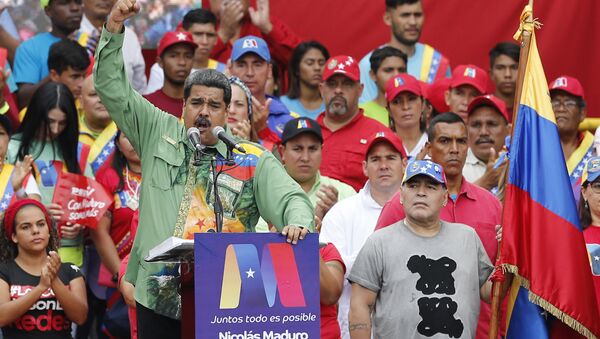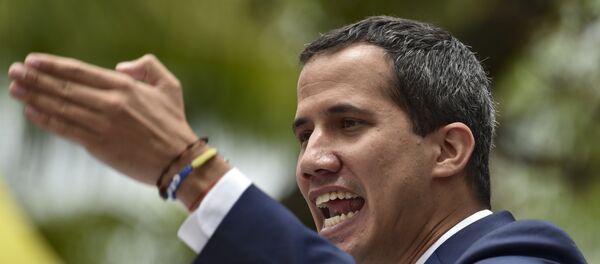Sputnik has discussed the crisis in Venezuela with Julia Buxton, Professor of Comparative politics at the Central European University.
Sputnik: According to CNN, the Trump administration wants to find a way to financially support Venezuelan opposition leader and self-proclaimed interim president Juan Guaido with an "influx of cash". How justified is the US support for Guaido and the opposition?
Even though it seems like they have a lot of people out in the streets in support for the opposition, the reality is that in an election process I think Guaido would probably face quite a potentially serious challenge from another chavista if Maduro is barred from running. So US funding really just helps the opposition to circumvent the more problematic, and long-term and really quite democratic task of reconnecting to Venezuelan voters and understanding what the Venezuelan voters want.
READ MORE: Guaido Confirms He's Considering Asking US Military to Intervene in Venezuela
And US cash also helps the opposition to paper over very deep divisions. So the reality is that ultimately it may seem like it short-term fix but it's really not going to help the opposition in the longer-term, it makes them look like puppets of the US government, and it's never really, in my view, been justified, the US has been supporting the opposition since even 1999, all the way back to when Chavez was first elected, it's not helped them, it makes them look like stooges of America, and I think ultimately, at the end of the day, the opposition just needs to re-define themselves as a domestic political proposition.
Sputnik: Mexico and Germany oppose any scenario of military intervention in Venezuela, believing that it would lead to catastrophic consequences. Is there a real threat of the US military intervening in Venezuela?
First of all, Trump has been reluctant to commit US forces overseas. As you're probably aware he's tried to pull the US out of Syria; also any form of military intervention will not play well with some within Trump's political constituency, his domestic supporters, who really don't want to see US troops committed overseas. Such a move would face a huge backlash from a number of politicians and the public in Latin America. I think the other thing also is that if the US did intervene militarily it would not be a quick operation.
READ MORE: WATCH Venezuela Servicemen Burn Letter From Guaido
The US risks triggering a civil war that could spill over into neighbouring Colombia, and it also means that the US would have to bear the cost of reconstruction in Venezuela were they to intervene militarily. So I think if Trump is weighing up the costs of intervening and the benefits, the costs for him right now are very, very high, and I think that's why the US is really trying to erode Maduro through more types of psychological operations rather than big troop commitments. From what we hear, the US military do not really want to be engaged overseas in this campaign in Venezuela, and Trump could also face opposition from within the US Congress. He might need congressional approval, and I think that he would really struggle to get that.
Sputnik: In a campaign video for the 2020 elections democratic candidate Tulsi Gabbard slammed Washington's war rhetoric particularly towards Venezuela. How much support is really there inside the US political landscape for involvement in the Venezuela crisis?
This could play well building up to an election process, but I think that while we do have a bipartisan consensus, Barack Obama introduced the sanctions on Venezuela, it wasn't a Republican president, it was the Bill Clinton administration that initially refused to give a visa to Chavez right back in 1998 when he was just still a presidential candidate. So in the top ranks of the Democrats and the Republicans we do see this bipartisan consensus, but we are seeing that beginning to break now.
READ MORE: US' Real Actions Contradict Verbal Crusade Over Venezuela 'Humanitarian Crisis'
Particularly, we're seeing Democrats, as you highlight in your question, who really don't want any form of military engagement in Venezuela, and who're also becoming concerned at the increasing aggression of statements from people like John Bolton and Secretary of State Mike Pompeo. So I think now with the latest, the third defeat as it were for Guaido in his efforts to remove Maduro, there are voices in the Democrats and also some Republican voices who are saying that maybe a different strategy is required.
Sputnik: While the coup appears to have been thwarted by Caracas, what does Guaido have to offer to the Venezuelan people apart from his pledge to topple Maduro?
Julia Buxton: Guaido is really focused on a big metanarrative of democratisation, of an end to corruption, of an end to human rights abuses and security sector abuse in Venezuela. So his whole message is very about real political transformation in the country. The reality is that I think Guaido is going to have a real problem, any opposition leader, if they come to power is going have a real problem because fundamentally they're oriented to the view that Venezuela has to move back to neoliberal market-led reforms in order to get its economy back on its feet.
So Guaido is in essence offering transformative change for Venezuela, but the reality is, I very much doubt he has the capacity to deliver very much, given the institutional constraints, the depths of the types of problems which will be inherited, and fundamentally, because of his lack of real cross-party cross-national support for the direction that he wants to take the country in, which is back to traditional market-led solutions and back into the US sphere of influence.
The views and opinions expressed by the speaker do not necessarily reflect those of Sputnik.





